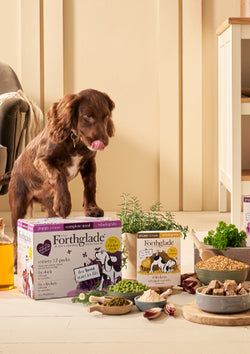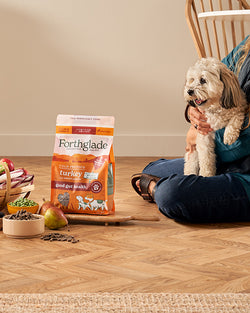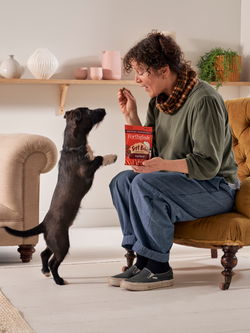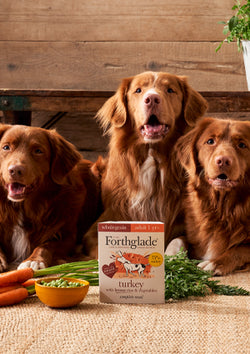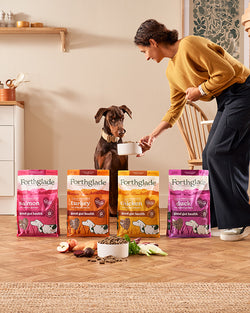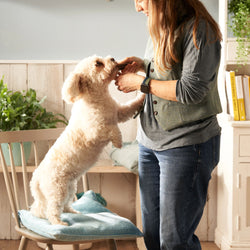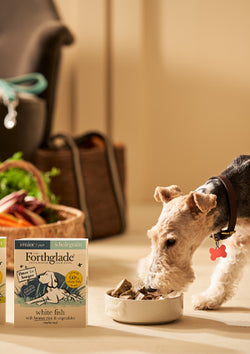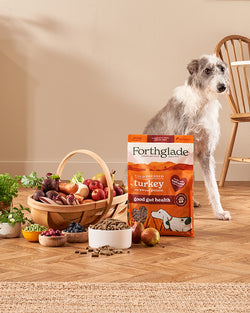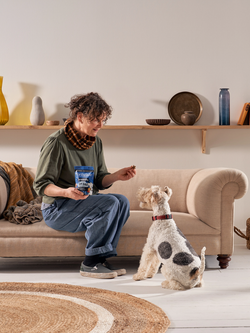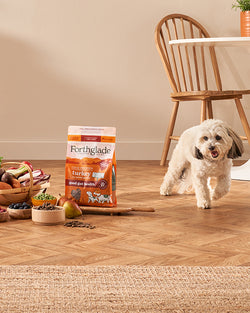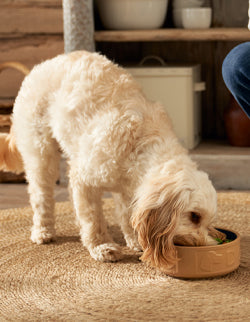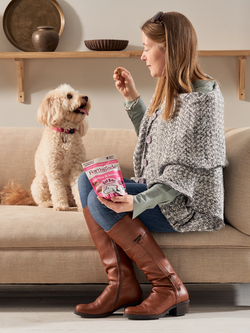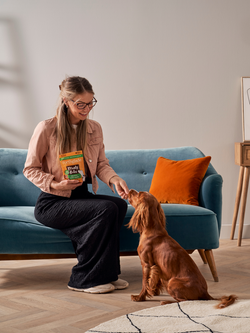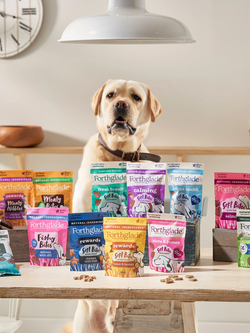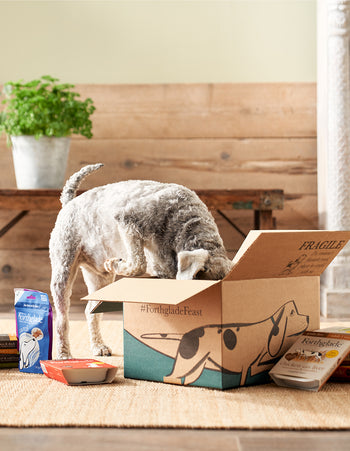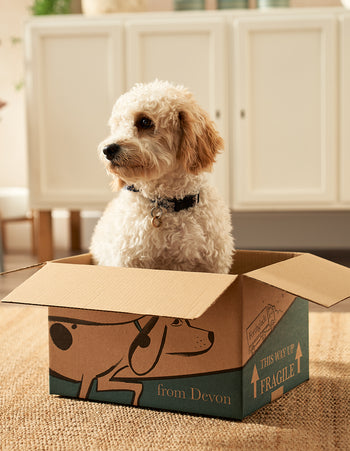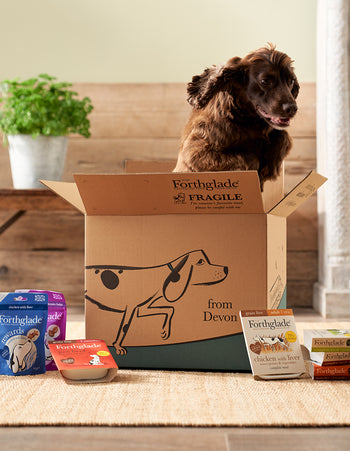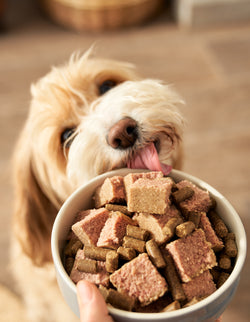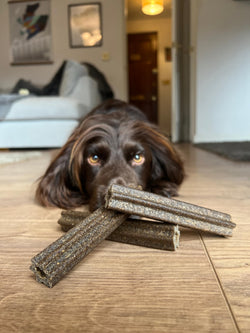Soft dog poop is something most owners will encounter at some point and while it might not be pleasant to pick up, it’s also not always a cause for concern. Understanding what’s normal and when to take action can help you support your dog’s gut health and keep those park walks worry free. In this blog, we’ll explore what soft dog poop is, why it might happen, and how to firm up dog poop naturally and quickly.

What is soft dog poop?
Soft dog poop is somewhere between well formed stools and full blown diarrhoea. It tends to be shapeless and squishy, but still pick-up-able. It may lack consistency, but it’s not watery or urgent, which is what distinguishes it from diarrhoea.
Most healthy dog poo is log shaped, firm but not hard, and easy to scoop up. Here’s a quick reference to help you visualise the difference:
| Type | Appearance | Texture | Pick-up-ability |
| Normal Poop | Well formed, log shaped | Firm but soft | Easy |
| Soft Poop | Lacks shape, squishy | Mushy, pliable | Trickier |
| Diarrhoea | Runny, often liquid | Watery | Difficult |
Why is my dog's poop soft?
There are several reasons why your dog might have soft stools. While it’s often nothing serious, identifying the cause is the first step to finding the right solution.
Overfeeding
Too much food can overwhelm your dog’s digestive system, leading to softer stools. Double check feeding guidelines and weigh portions to make sure you're not overdoing it.
Sudden Diet Change
Changing your dog’s food too quickly can upset their gut, resulting in soft or runny stools. Transition gradually over 7–10 days to help their tummy adjust. Learn how to switch your dog’s food safely
Food Sensitivities or Allergies
Some dogs are sensitive to certain ingredients, such as wheat, dairy, or specific proteins. If you suspect this might be the case, consider trying a hypoallergenic dog food with limited, gentle ingredients.
Low-Quality Diet
Not all dog foods are created equal. A diet lacking in essential nutrients or full of fillers can result in poor stool quality. Try to choose a high quality dog food with natural ingredients and no junk.
Eating Something They Shouldn’t
Dogs are curious by nature, and occasionally they eat things they shouldn’t, from human snacks to garden debris. This can quickly lead to soft stools or even diarrhoea.
Learn more about common foods that are poisonous to dogs
Stress or Excitement
Just like humans, dogs can get an upset tummy when they’re anxious or overexcited. New environments, visitors, or separation anxiety can all be triggers.

What to do if your dog has runny stool (AKA: Diarrhoea)
If your dog’s poop becomes watery, urgent, or frequent, it could be diarrhoea, which might signal something more serious, such as an infection or parasite. Find out more about why your dog has diarrhoea
Make sure they stay hydrated, rest, and avoid treats or rich foods. If symptoms persist for more than 24 hours or are accompanied by vomiting or lethargy, contact your vet.
How to firm up dog poop quickly
Once you’ve identified the cause, you can take simple steps to support your dog’s digestion and encourage firmer poops. Here are some quick and natural remedies that may help:
- Feed a bland diet: Boiled chicken and rice for 24–48 hours can give the gut a break
- Add pumpkin or sweet potato: Rich in fibre and gentle on the stomach
- Check portion sizes: Don’t overfeed
- Limit treats and table scraps
- Avoid sudden food changes
- Try a grain free dog food if you suspect a grain sensitives
- Switch to hypoallergenic dog food if sensitives are a concern
- Add probiotics: Ask your vet about dog safe probiotic supplements
Keep an eye on your dog’s poop daily, as it’s one of the clearest signs of what’s going on inside their digestive system.

When to see a vet about your dog’s soft poop
Most cases of soft stool resolve on their own with a few tweaks to diet or routine. However, it’s best to see a vet if:
- The soft stools persist for more than a few days
- You notice blood, mucus, or worms in the stool
- Your dog is vomiting, lethargic, or off their food
- Diarrhoea comes on suddenly and severely
- Your dog is very young, elderly, or has existing health issues
Remember: when in doubt, speak to your vet, especially if you have any concerns about your dog’s digestion.

Conclusion
Soft dog poop is common and often nothing to worry about. In many cases, a simple diet tweak or feeding adjustment is all it takes to help things firm up again.
The best way to maintain a healthy, happy gut? Feed your dog a high quality dog food made with natural ingredients you can trust. At Forthglade, we believe that good health starts from the inside out and a happy tummy makes for a happy dog.




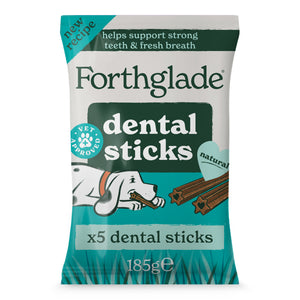
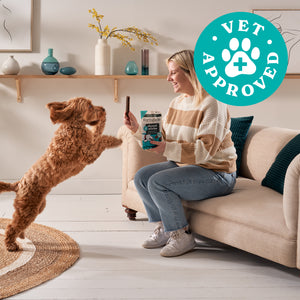
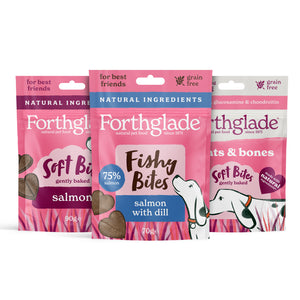
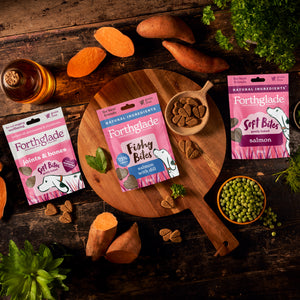


 FAST & FREE DELIVERY ON ORDERS £40+*
FAST & FREE DELIVERY ON ORDERS £40+*
 SUBSCRIBE TO SAVE 10% OFF EVERY ORDER
SUBSCRIBE TO SAVE 10% OFF EVERY ORDER
 OVER 13,600 5 STAR REVIEWS
OVER 13,600 5 STAR REVIEWS


